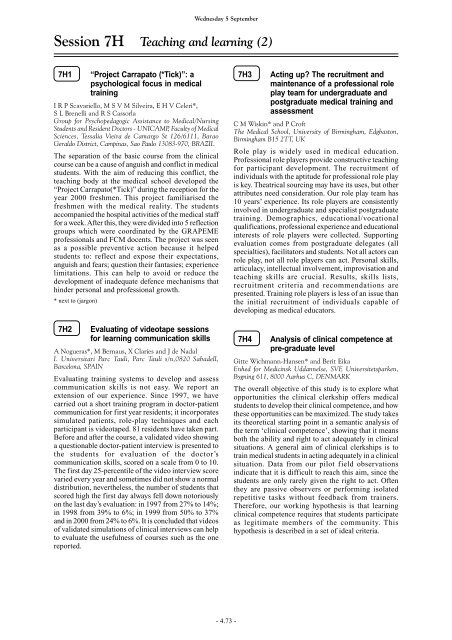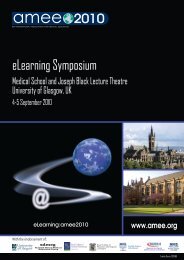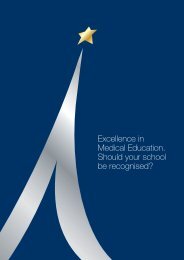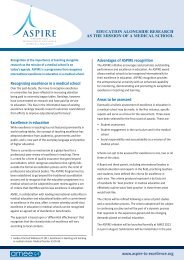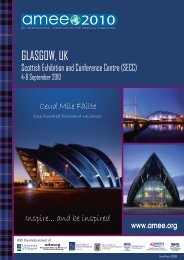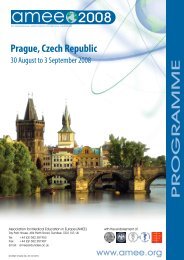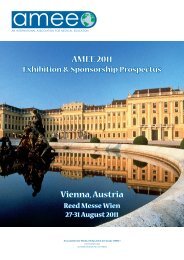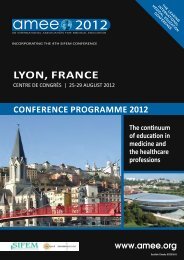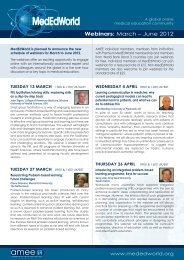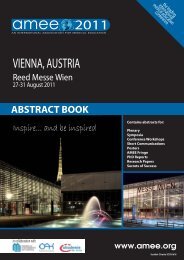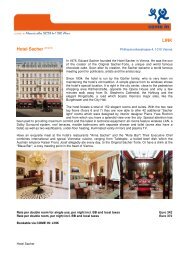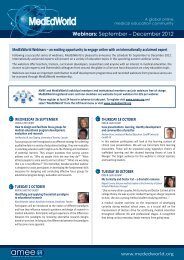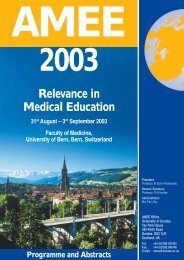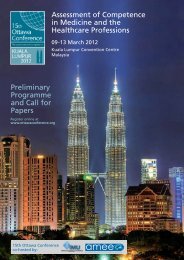AMEE Berlin 2002 Programme
AMEE Berlin 2002 Programme
AMEE Berlin 2002 Programme
You also want an ePaper? Increase the reach of your titles
YUMPU automatically turns print PDFs into web optimized ePapers that Google loves.
Session 7H Teaching and learning (2)<br />
7H1 “Project Carrapato (*Tick)”: a<br />
psychological focus in medical<br />
training<br />
I R P Scavariello, M S V M Silveira, E H V Celeri*,<br />
S L Brenelli and R S Cassorla<br />
Group for Psychopedagogic Assistance to Medical/Nursing<br />
Students and Resident Doctors - UNICAMP, Faculty of Medical<br />
Sciences, Tessalia Vieira de Camargo St 126/6111, Barao<br />
Geraldo District, Campinas, Sao Paulo 13083-970, BRAZIL<br />
The separation of the basic course from the clinical<br />
course can be a cause of anguish and conflict in medical<br />
students. With the aim of reducing this conflict, the<br />
teaching body at the medical school developed the<br />
“Project Carrapato(*Tick)” during the reception for the<br />
year 2000 freshmen. This project familiarised the<br />
freshmen with the medical reality. The students<br />
accompanied the hospital activities of the medical staff<br />
for a week. After this, they were divided into 5 reflection<br />
groups which were coordinated by the GRAPEME<br />
professionals and FCM docents. The project was seen<br />
as a possible preventive action because it helped<br />
students to: reflect and expose their expectations,<br />
anguish and fears; question their fantasies; experience<br />
limitations. This can help to avoid or reduce the<br />
development of inadequate defence mechanisms that<br />
hinder personal and professional growth.<br />
* next to (jargon)<br />
7H2 Evaluating of videotape sessions<br />
for learning communication skills<br />
A Nogueras*, M Bernaus, X Claries and J de Nadal<br />
I. Universitari Parc Tauli, Parc Tauli s/n,0820 Sabadell,<br />
Barcelona, SPAIN<br />
Evaluating training systems to develop and assess<br />
communication skills is not easy. We report an<br />
extension of our experience. Since 1997, we have<br />
carried out a short training program in doctor-patient<br />
communication for first year residents; it incorporates<br />
simulated patients, role-play techniques and each<br />
participant is videotaped. 81 residents have taken part.<br />
Before and after the course, a validated video showing<br />
a questionable doctor-patient interview is presented to<br />
the students for evaluation of the doctor’s<br />
communication skills, scored on a scale from 0 to 10.<br />
The first day 25-percentile of the video interview score<br />
varied every year and sometimes did not show a normal<br />
distribution, nevertheless, the number of students that<br />
scored high the first day always fell down notoriously<br />
on the last day’s evaluation: in 1997 from 27% to 14%;<br />
in 1998 from 39% to 6%; in 1999 from 50% to 37%<br />
and in 2000 from 24% to 6%. It is concluded that videos<br />
of validated simulations of clinical interviews can help<br />
to evaluate the usefulness of courses such as the one<br />
reported.<br />
Wednesday 5 September<br />
- 4.73 -<br />
7H3 Acting up? The recruitment and<br />
maintenance of a professional role<br />
play team for undergraduate and<br />
postgraduate medical training and<br />
assessment<br />
C M Wiskin* and P Croft<br />
The Medical School, University of Birmingham, Edgbaston,<br />
Birmingham B15 2TT, UK<br />
Role play is widely used in medical education.<br />
Professional role players provide constructive teaching<br />
for participant development. The recruitment of<br />
individuals with the aptitude for professional role play<br />
is key. Theatrical sourcing may have its uses, but other<br />
attributes need consideration. Our role play team has<br />
10 years’ experience. Its role players are consistently<br />
involved in undergraduate and specialist postgraduate<br />
training. Demographics, educational/vocational<br />
qualifications, professional experience and educational<br />
interests of role players were collected. Supporting<br />
evaluation comes from postgraduate delegates (all<br />
specialties), facilitators and students. Not all actors can<br />
role play, not all role players can act. Personal skills,<br />
articulacy, intellectual involvement, improvisation and<br />
teaching skills are crucial. Results, skills lists,<br />
recruitment criteria and recommendations are<br />
presented. Training role players is less of an issue than<br />
the initial recruitment of individuals capable of<br />
developing as medical educators.<br />
7H4 Analysis of clinical competence at<br />
pre-graduate level<br />
Gitte Wichmann-Hansen* and Berit Eika<br />
Enhed for Medicinsk Uddannelse, SVF, Universitetsparken,<br />
Bygning 611, 8000 Aarhus C, DENMARK<br />
The overall objective of this study is to explore what<br />
opportunities the clinical clerkship offers medical<br />
students to develop their clinical competence, and how<br />
these opportunities can be maximized. The study takes<br />
its theoretical starting point in a semantic analysis of<br />
the term ‘clinical competence’, showing that it means<br />
both the ability and right to act adequately in clinical<br />
situations. A general aim of clinical clerkships is to<br />
train medical students in acting adequately in a clinical<br />
situation. Data from our pilot field observations<br />
indicate that it is difficult to reach this aim, since the<br />
students are only rarely given the right to act. Often<br />
they are passive observers or performing isolated<br />
repetitive tasks without feedback from trainers.<br />
Therefore, our working hypothesis is that learning<br />
clinical competence requires that students participate<br />
as legitimate members of the community. This<br />
hypothesis is described in a set of ideal criteria.


